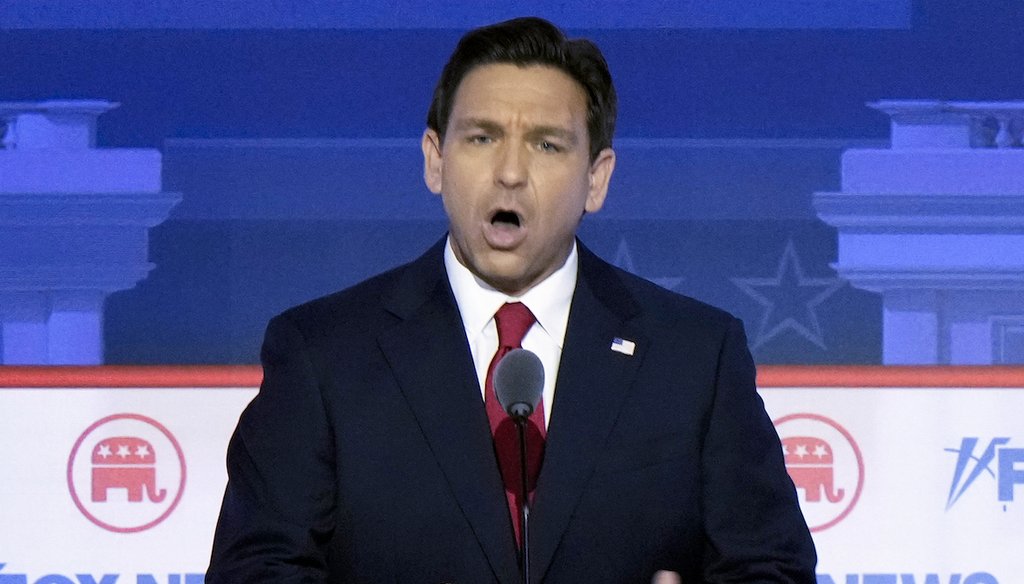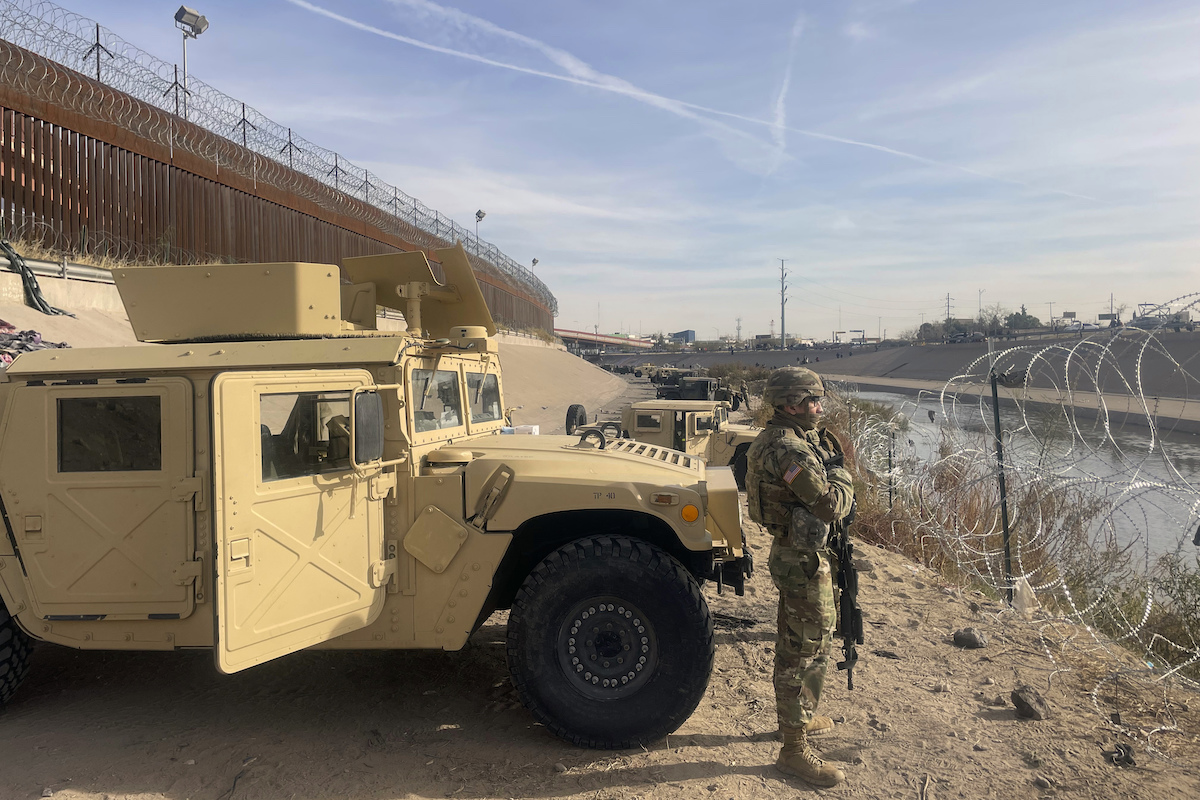Stand up for the facts!
Our only agenda is to publish the truth so you can be an informed participant in democracy.
We need your help.
I would like to contribute

Republican presidential candidate Florida Gov. Ron DeSantis speaks during a Republican presidential primary debate hosted by Fox News Channel, Aug. 23, 2023, in Milwaukee. (AP)
If Your Time is short
-
A president can deploy the military to a foreign country only if there is an “imminent attack” or if it is in the United States’ national interest. Only Congress has the power to declare war.
-
Killing people because Border Patrol suspects they are carrying drugs would be considered an extrajudicial killing because it would violate domestic and international law, said Stephanie Brewer, Mexico director at the Washington Office on Latin America, a research and human rights advocacy group.
-
Immigration officials may use deadly force, but “only when necessary” in situations in which someone poses “imminent danger of serious bodily injury or death” to the officer or another person.
During the first Republican presidential primary debate, several candidates vying for the 2024 nomination said they would use force against Mexican cartels to stop the smuggling of fentanyl into the United States and prevent Americans from overdosing on the potent drug.
Florida Gov. Ron DeSantis said he’d declare a national emergency and send troops to the southern border and to Mexico.
"When these drug pushers are bringing fentanyl across the border, that's gonna be the last thing they do," DeSantis said during the Aug. 23 debate at Milwaukee’s Fiserv Forum that was broadcast on Fox News. "We’re gonna use force and we’re gonna leave them stone cold dead."
DeSantis did not expand on his plans to "use force" and leave people "stone cold dead" if they smuggle drugs into the U.S. And a campaign spokesperson did not answer our questions.
Former Vice President Mike Pence and former Arkansas Gov. Asa Hutchinson, who are also competing for the Republican nomination and were onstage for the debate, said they would cooperate with Mexico in their enforcement strategies.
"We will partner with the Mexican military and we will hunt down and destroy the cartels," Pence said.
"There would be lethal force used by the Border Patrol law enforcement as needed to protect the border. Absolutely," Hutchinson said.
PolitiFact examined whether DeSantis' proposals would limit fentanyl flow into the U.S., and a president’s powers to send troops to Mexico or use lethal force against drug smugglers at the border.
DeSantis’ plan would do "virtually nothing" to stop the flow of fentanyl, said Doug Massey, a public affairs professor at Princeton University. Other experts agreed with him.
Katherine Yon Ebright, an expert on constitutional war powers at the Brennan Center for Justice, said these proposals conflate "the opioid epidemic, the smuggling of fentanyl and the movement of migrants and asylum seekers."
Most fentanyl is seized at official ports of entry, not between them, which is where most migrants try to cross the border, CBP data shows. And in 2022, 89% of convicted fentanyl drug traffickers were U.S. citizens.
The argument that U.S. armed forces would completely dismantle Mexico’s drug trafficking networks "is an idea without basis in reality, even if we set aside all the legal questions," said Stephanie Brewer, director of Mexico at the Washington Office on Latin America, a research and human rights advocacy group.
She cited a statistic from The Washington Post that fentanyl is so powerful that "a year’s supply of pure fentanyl powder for the U.S. market would fit in the beds of two pickup trucks."

A homeless person holds pieces of fentanyl Aug. 18, 2022, in Los Angeles. Use of the powerful synthetic opioid that is cheap to produce and is often sold as is or laced in other drugs, has exploded. (AP)
The president has the authority to use the military if there is an "imminent attack." What constitutes an imminent attack has broadened over the years.
Executive branch lawyers have argued that the president "can direct the use of lethal force" if it is in the national interest, Yon Ebright said. However, that’s if the duration and nature of that use of force is "not likely to lead to war."
Only Congress has the power to declare war under the U.S. Constitution.
There isn’t much Congress can do if it disagrees with the president’s argument that using force is in the country’s national interest, Yon Ebright said. Congress can pass a mainly symbolic nonbinding resolution saying it disagrees or it can limit appropriations for that specific conflict.
Most experts we spoke with said yes, but they added that it’s unlikely that the Mexican government would respond with force or declare a war against the U.S.
"If any president deployed U.S. military forces to Mexico, that would violate Mexican sovereignty and would be considered an act of war by Mexico," said William Banks, a national security expert and Syracuse University professor.
Historically, when U.S. presidents have used armed forces for raids or airstrikes in foreign countries against terrorist organizations which are "non-state organizations just like a cartel," the host country has consented to it, Yon Ebright said.
"The difference here is that one of the things DeSantis is proposing, and it's quite shocking, is to use lethal force in Mexico against cartels, potentially without the consent of the Mexican government," said Yon Ebright.

Troops stand guard Dec. 20, 2022, along the U.S.-Mexico border in El Paso, Texas. (AP)
Yes, and it’s already been done. President Joe Biden and his predecessors have sent troops to border states to support Border Patrol agents amid increased migration. Troops at the border transport these agents, operate and repair surveillance vehicles and clean brush. They do not engage with migrants or participate in law enforcement, said Joseph Nunn, a Brennan Center expert on the U.S. military’s domestic activities.
But, Nunn said, DeSantis is apparently proposing using the military to enforce civilian law at the border.
The Insurrection Act, a vague law from the 1800s, allows the president to deploy the military domestically to enforce the law, including immigration law. However, the statute is not designed for continuing policy challenges, "which is what we have at the U.S.-Mexico border," Nunn said.
Yes, but only under limited exceptions.
Immigration officials are allowed to use deadly force, but "only when necessary" in situations where someone poses "imminent danger of serious bodily injury or death" to the officer or another person.
Border Patrol "cannot kill someone solely for entering the United States illegally or carrying drugs," David Bier, immigration studies director at the Cato Institute, a Washington, D.C.-based libertarian think tank.
Killing people because Border Patrol suspects they are carrying drugs would be considered an extrajudicial killing because it would violate both domestic and international law, Brewer said.
"There are due process concerns, anytime that the federal government is directing law enforcement or the military, or whoever to shoot first and ask questions later," said Nunn.
In recent decades, the U.S. has worked with Mexico to limit immigration and drug flows.
The U.S. government has provided billions of dollars to Mexico for security and counternarcotics assistance, according to the Council on Foreign Relations, a New York-based think tank focused on policy issues. Mexico has also deployed its own National Guard members to its borders to mitigate the number of migrants that reach the U.S.-Mexico border.
However, "in recent history the U.S. has not directly sent its own military into Mexico in the way that is apparently now being proposed" by Republican presidential candidates, Brewer said.
RELATED: Immigration plans by Donald Trump and Ron DeSantis face obstacles
Our Sources
The New York Times, DeSantis calls for ‘deadly force’ against suspected drug traffickers, June 26, 2023
NBC News, Ron DeSantis endorses ‘deadly force’ against migrants suspected of trafficking drugs, June 26, 2023
Just Security, DeSantis campaign’s border proposal raises separation of powers concerns, July 18, 2023
The Wall Street Journal, First 2024 Republican presidential debate: live analysis, Aug. 24, 2023
The Associated Press, The Pentagon is pulling 1,100 troops from the US-Mexico border mission, Aug. 1, 2023
Bloomberg News, DeSantis vows to send US military into Mexico to stop fentanyl labs, Aug. 23, 2023
Fox News, DeSantis says he would use military force to take out Mexican drug cartels: ‘Darn right I would’, Aug. 23, 2023
Cato Institute, U.S. citizens were 89% of convicted fentanyl traffickers in 2022, Aug. 23, 2023
Ron DeSantis, Stop the invasion, Aug. 24, 2023
The Guardian, Republican states send national guard troops to Texas border in show of force, Jun.8, 2023
Email interview with Stephanie Brewer, Director for Mexico at Washington Office on Latin America: Advocacy for Human Rights in the Americas, Aug. 24, 2023
Zoom interview with Joseph Nunn and Katherine Yon Ebright, Brennan Center for Justice, Aug. 24, 2023
Email interview with Douglas S. Massey, professor of sociology and public affairs, the Princeton School of Public and International Affairs, Aug. 24, 2023
Email interview with William C. Banks, professor emeritus, Public Administration and International Affairs Department at Syracuse University, Aug. 24, 2023
Email interview with Julia Friedland, deputy press secretary, executive office of Gov. Ron DeSantis, Aug. 24, 2023
PolitiFact, Title 42 expiration: What's next for migrants applying for asylum at U.S.’ southern border?, May 8, 2023
Council on Foreign Relations, How the U.S. patrols Its borders, Jul. 26, 2023
Congressional Research Service, U.S. Customs and Border Protection’s powers and limitations: a primer, Nov. 30, 2021
Vox, What Trump’s "lethal force" authorization means at the border, Nov 27, 2018
Politico, Biden’s troop deployment to the border is different from Trump’s, May 12, 2023

























